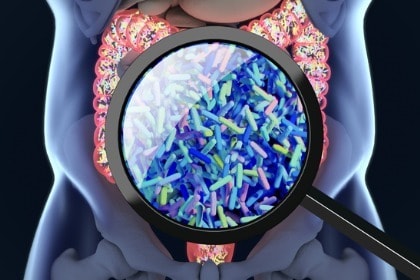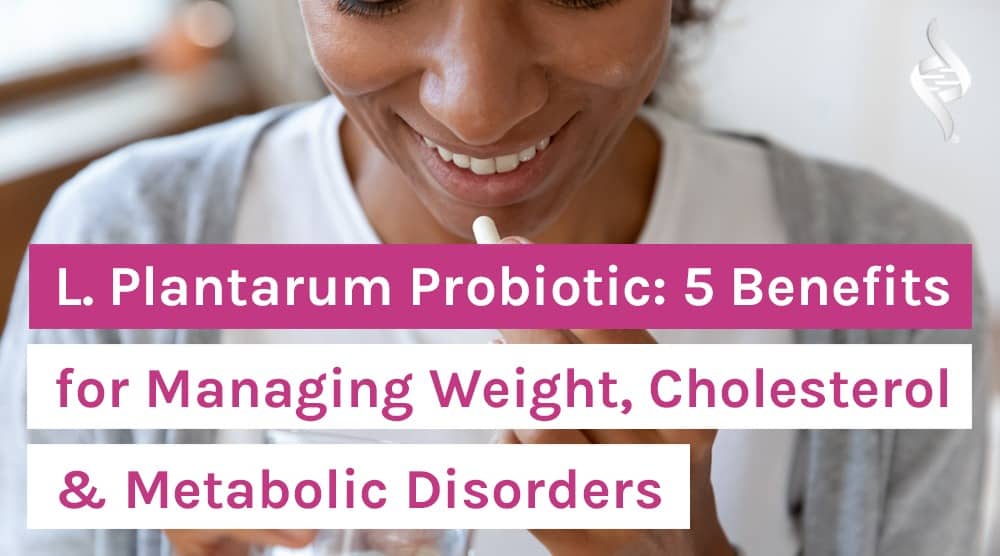L. Plantarum Probiotic: 5 Benefits for Managing Weight, Cholesterol & Metabolic Disorders
In a hurry? Click here to read the Article Summary...
You’ve likely heard about the importance of probiotics for gut health and a strong immune system. But did you know that scientists are discovering ways that certain bacteria may influence how much fat you carry on your body, your cholesterol levels, and even play a role in conditions such as diabetes?
In this article, we’re looking specifically at scientific research into the L. plantarum probiotic and how it’s been shown to contribute to better overall metabolic health and a leaner physique.
In This Article:
- Humans Cannot Live Without Bacteria
- An Introduction to L. Plantarum Probiotic
- L. Plantarum Is One of the Best “Good Guys”
- The Anti-Inflammatory Potential of L. Plantarum
- L. Plantarum Benefits for Gut Health
- L. Plantarum Probiotic Counters Dyslipidemia
- L. Plantarum as a Diabetes Fighter
- L. Plantarum Probiotic and Anti-Obesity
Humans Cannot Live Without Bacteria
Bacteria are believed to have been among the first life forms to appear on Earth and today they can be found in almost every imaginable habitat on the planet. Many bacteria live in symbiotic and parasitic relationships with other forms of life – including us humans. In fact, we literally cannot live without bacteria!
For instance, only some bacteria have the genes and the enzymes needed to make vitamin B12 (cobalamin), which is essential for metabolic processes that go on every day in every cell of your body.
Millions of bacteria living in your gut also help you to:
- digest your food
- absorb nutrients
- make vitamins
- protect your gut lining
- manage inflammation within safe levels
- maintain a happy, stable mood
- and much more
Fermentation Uses Bacteria to Our Benefit
For centuries, humans have deliberately exploited bacteria to our advantage. Many cultures have traditionally fermented milk, vegetables, and even meat to make these foods safer for consumption, to be able to store them longer, and to extend their range of flavors and aromas [1].

This process of fermentation is possible because of lactic acid bacteria (LAB), which have the ability to convert sugars into lactic acid [2].
Today, LAB are widely used in industrial food fermentation for the production of fermented milk products, bread, cereals, and vegetables, as well as for manufacturing various pharmaceutical products [3-5].
An Introduction to L. Plantarum Probiotic
Lactobacillus plantarum (L. plantarum) is a non-gas-producing LAB that has long been used in commercial fermentation processes [6].
It is known to be naturally present in human breast milk, cheese, and other fermented food products such as kimchi. Nowadays, L. plantarum is increasingly being recognized as a health-giving probiotic.
What Are Probiotics?
Just in case you’re not exactly clear on what a probiotic is, the term literally means “for life”. The accepted definition of probiotics is “live microorganisms, which when administered in adequate amounts, confer a health benefit on the host” [7,8].
In simple terms, probiotics are the “good” bacteria that you consume in food or supplement form that help you get and/or stay healthy.
What Is the Gut Microbiota?

Your gut contains a mixture of health-promoting, harmful, and neutral bacterial species, collectively known as microbiota. Your gut microbiota is shaped by the events of your early life such as antibiotic usage. As you grow into adulthood, it is further influenced by factors such as your [9]:
- body mass index (BMI) level
- exercise frequency
- lifestyle
- cultural and dietary habits
As a result, the composition of your gut microbiota is unique to you, like a fingerprint.
L. Plantarum Is One of the Best “Good Guys” to Have on Your Side
Lactobacillus plantarum is recognized as a safe probiotic by both the FDA and the European Food Safety Authority (EFSA) [10,11]. Lactic acid bacteria such as L. plantarum have a positive influence on your gut microbiota and, by extension, on your health and well-being in multiple ways.
Thanks to its ability to resist acid and bile salt, L. plantarum is able to move unharmed through the stomach and upper gut and eventually colonize the lower gut [12].
Let’s now explore 5 specific ways L. plantarum has been shown in laboratory research to support metabolic health.
#1 – The Anti-Inflammatory Potential of L. Plantarum
Inflammation is an essential process in which both immune and non-immune cells are mobilized to protect you from bacteria, viruses, toxins, and infections [13].

However, systemic, low-grade, ongoing/chronic inflammation, has been shown to trigger the development and the speed of progression of a wide range of health issues – including inflammatory bowel diseases (IBD) such as Crohn’s disease and ulcerative colitis.
Systemic, chronic inflammation has also been implicated in various autoimmune conditions and metabolic disorders such as type 2 diabetes and heart disease [14,15].
Promisingly, L. plantarum appears to have significant anti-inflammatory potential and may prove beneficial in the treatment of these metabolic disorders.
For example, an increase in levels of molecules known as lipopolysaccharides (LPS) results in inflammation and has been shown to induce colitis in a laboratory mouse model [16]. Several strains of L. plantarum have been shown to prevent LPS-induced inflammation, thereby inhibiting colitis formation in these mice [17].
#2 – L. Plantarum Benefits for Gut Health
Since probiotics were first recognized for their role in improving gut health, this is the minimum requirement for any probiotic to be deemed effective and beneficial.
L. plantarum has been demonstrated in multiple animal studies to go far beyond this low bar and helps relieve the symptoms of painful gut conditions such as inflammatory bowel diseases (IBD), including Crohn’s disease and ulcerative colitis. (Note: ulcerative colitis is mainly seen in the colon and/or rectum, whereas Crohn’s disease can manifest in any part of the intestine.)

Promisingly, L. plantarum consumed in drinking water led to improvements in the large intestine in a laboratory mouse model of IBD, along with a significant reduction in inflammation levels [18].
Similarly, consumption of L. plantarum was seen to lower levels of pro-inflammatory immune signaling molecules known as cytokines in mice, along with reducing the severity of induced colitis [19].
In another study, treatment with L. plantarum was seen to reduce damage to the colon in a rat model of ulcerative colitis, while also lowering the expression of various pro-inflammatory immune molecules [20].
#3 – L. Plantarum Probiotic Counters Dyslipidemia
Dyslipidemia is defined as having abnormal levels of blood lipids and lipoproteins. For example, patients with this condition exhibit higher than normal levels of total cholesterol, triglycerides, and low-density lipoprotein (LDL-C), and lower than normal levels of high-density lipoprotein (HDL-C).
Dyslipidemia has been linked to a greater likelihood of obesity, type 2 diabetes, atherosclerosis, and coronary heart disease.
In laboratory experiments, obese mice that consumed L. plantarum showed improved markers of dyslipidemia with reductions in their:
- total cholesterol
- triglycerides
- LDL-C
They also exhibited lower levels of intestinal inflammation [21] while simultaneously their HDL-C (“good” cholesterol) levels increased.

In a randomized, double-blind, placebo-controlled, parallel-group study, 100 healthy subjects were randomly assigned to consume L. plantarum or a placebo for 12 weeks. Daily consumption of L. plantarum had a beneficial effect on markers of inflammation and also lowered levels of total cholesterol and LDL-C, especially in those subjects who were at risk of inflammation [22].
L. Plantarum Showed Positive Benefits for NAFLD
Non-alcoholic fatty liver disease (NAFLD) – typically characterized by excessive fat accumulation in liver cells known as hepatocytes – can be induced in experimental animals by feeding them a high-fat diet.
Promisingly, these laboratory animal models showed improved liver function and lipid metabolism when they consumed various strains of L. plantarum at the same time as their high-fat diet.
In one such laboratory animal model of NAFLD, L. plantarum was seen to restore normal liver function, while also lowering the expression of pro-inflammatory molecules and reducing the accumulation of fat in the liver [23].
#4 – L. Plantarum as a Diabetes Fighter
Diabetes is a chronic disease related to insulin abnormality. This condition results in higher than normal blood sugar levels, along with many adverse health consequences including a significantly higher risk of heart and kidney disease, impaired vision, and more.

Deficient insulin production in the pancreas is a hallmark of type 1 diabetes, also known as insulin-dependent, juvenile or childhood-onset diabetes. On the other hand, type 2 diabetes – also known as noninsulin-dependent or adult-onset diabetes – results from the ineffective use of insulin by the body, for various reasons.
In a laboratory mouse model of type 2 diabetes, oral administration of L. plantarum found to lower levels of blood sugar and hemoglobin A1C, an important marker of long-term diabetes control. Further, the results of this study suggested that L. plantarum has antioxidant and anti-inflammatory properties [24].
Similarly, in a laboratory rat model of insulin resistance, L. plantarum, in combination with a preparation of fermented fruits and vegetables, was seen to prevent body weight gain.
L. plantarum also reversed increases in levels of [25]:
- fasting blood glucose
- insulin
- total cholesterol
- triglycerides
- LDL-C
Better Diversity of Gut Bacteria
In another study, mice on a high-fat diet given L. plantarum, in combination with green tea powder, showed a significantly increased diversity of bacteria in their intestines, along with reduced levels of inflammation markers and metabolic markers that are typically associated with diabetes [26]. (Note: a higher diversity of gut bacteria is considered highly beneficial/desirable by most health experts.)
#5 – L. Plantarum Probiotic and Anti-Obesity
In 2015, more than a third of US adults and 15–20% of children and adolescents had been diagnosed as obese. By 2030, this number is expected to rise to almost 50 percent [27]!

Similar to other metabolic disorders, obesity has been linked to a higher risk of systemic, chronic inflammation – the silent killer that increases the risk of many adverse health conditions.
Promisingly, strains of L. plantarum have been shown to have anti-obesity properties in laboratory experiments [28]. Interestingly, genetic profiles of gut microbiota – known as microbiomes – that are specifically associated with obesity have been identified, which are often found to be prevalent in obese individuals [29].
The mesentery is an organ that attaches our intestines to our posterior abdominal wall. It helps to store fat and also allows blood vessels, lymphatics, and nerves to supply the intestines. In laboratory animal experiments, L. plantarum was seen to reduce the levels of fat deposited in the mesentery [30].
Similarly, administration of L. plantarum and L. curvatus (another probiotic) to mice on a high-fat diet was seen to [31]:
- reduce body weight gain
- prevent fat accumulation
- lower insulin levels
- lower total cholesterol
- lower liver inflammation
In conclusion, many strains of L. plantarum are promising probiotic candidates that can offer significant health benefits for your gut as well as for better management of abnormal cholesterol and lipid levels and their consequences, diabetes, obesity, and other metabolic disorders.
Organixx ProBiotixx+ formula contains a single, super-strain of Lactobacillus plantarum, designed to help alleviate constipation… eliminate gas and belly bloat… support your entire immune system… and give you total digestive protection.

 Sources:
Sources:
Article Summary
The L. plantarum probiotic has been shown in a variety of scientific studies to contribute to better overall metabolic health and a leaner physique.
Lactobacillus plantarum (L. plantarum) is a lactic acid bacteria known to be naturally present in human breast milk, cheese, and other fermented food products such as kimchi.
Due to its ability to resist acid and bile salt, L. plantarum is able to move unharmed through the stomach and upper gut and eventually colonize the lower gut.
Chronic inflammation has been implicated in various autoimmune conditions and metabolic disorders such as type 2 diabetes and heart disease. L. plantarum appears to have significant anti-inflammatory potential.
In multiple animal studies, L. plantarum helped relieve the symptoms of painful gut conditions such as inflammatory bowel diseases (IBD).
Dyslipidemia is linked to a greater likelihood of obesity, type 2 diabetes, atherosclerosis, and coronary heart disease. In studies, obese mice that consumed L. plantarum showed improved markers of dyslipidemia.
Oral administration of L. plantarum was found to lower levels of blood sugar and hemoglobin A1C in animal type 2 diabetes experiments. In other studies, L. plantarum improved liver function and lipid metabolism when consumed along with a high-fat diet.
Organixx ProBiotixx+ is a supplement that provides a single, super-strain of L. plantarum probiotic.





Has this product been shown to be useful in patients with SIBO, SIFO, or IMO?
Hi Maureen,
Yes, generally speaking many people report relief from gut imbalances when taking the product. While probiotics can support a healthy gut, it is best to consult with your doctor to find out which strain would be correct for your specific health concerns. Wishing you a happy and healthy day! :)
When is the best time to take these. We ordered them and have on hand. Will they interfere with other medication.
Says 1-2 with meals and 1-2 at bedtime
Hello Kathy Radich,
Thank you for giving our ProBiotixx a try. ProBiotixx is to be used as needed and will also depend on your personal health. If you are experiencing symptoms, you may want to consider using the full dosage on the label (1-2 capsules at each meal and 1-2 capsules at bedtime). However, regular daily maintenance use would be 1 or 2 probiotics before bed.
I hope you find this information helpful.
Enjoy your day! :)
Is this a complete probiotic or do I also need to take something else?
Hello Nettie,
We appreciate your interest in our ProBitoxx.
ProBiotixx is a Single “super strain” of L. plantarum OM with 2.5 billion CFU that doubles every 20 minutes once it makes contact with the foods in your stomach.
Generally speaking most people can take this as a complete probiotic. However, each person has different need and tolerance levels. In this case we suggest speaking with your doctor to find out if this product is right for your specific health concerns.
Here is a link to the product information and label. This way you and your doctor can make an informed health decision together. https://shop.organixx.com/products/probiotixx
I hope you find this information helpful.
Wishing you a happy and healthy day! :)
Does your prpbotic contain mushrooms?
Hi Rona, thanks for your question.
No, our ProBiotixx supplement does not contain mushrooms.
Feel free to check out the ingredient label via the product page here: https://shop.organixx.com/products/probiotixx
Do let us know if you have any other questions. Alternatively, you can also check out our FAQs section here: https://support.organixx.com
Thanks so much. We hope you have yourself a wonderful day!!
Most important to know is whether or not this product is a dairy free form of ‘probiotic’?
Maggie
Hello Maggie,
That is a great question.
Organixx ProBiotixx+ is vegetarian but may not be considered vegan. It’s grown on a dairy-based medium which makes it much stronger, but the end product does NOT contain dairy. Based on this information you will need to determine for yourself if this product is appropriate for you or not.
I hope you find this information helpful.
Have an awesome day! :)